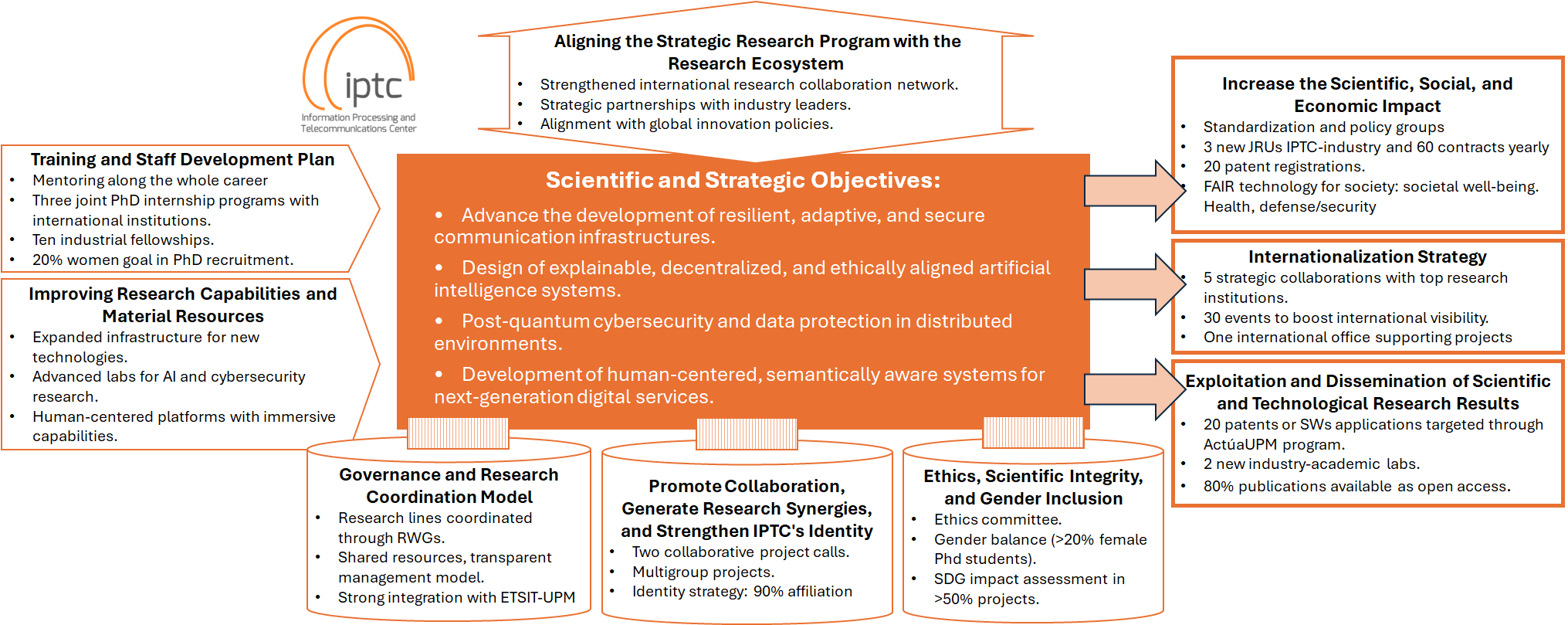Strategic Plan
The IPTC Strategic Research Plan 2026-2029 defines an ambitious plan to strengthen the center’s scientific leadership, international competitiveness, and national driving force for contributing to Europe’s digital transition. Analyzed the results obtained in the 2020-2024 period, this plan aims to push fordward IPTC’s two main research areas defining four scientific objectives:
- (1) next-generation communication infrastructures,
- (2) distributed and ethical artificial intelligence,
- (3) post-quantum cybersecurity, and
- (4) human-centered digital services.
These objectives align with European strategic frameworks such as the Digital Decade Strategy, Horizon Europe, and the European Defence Fund.

The plan integrates research, infrastructure, talent development, and collaboration into a coherent and ambitious strategy. The governance model will be expanded including an Advisory Committee and a Research Management structure including a Research Executive Board and Research Area Committees. The Research management structure will supervise the scientific agenda and resource needs.
An important aspect is the expansion of IPTC scientific infrastructure. IPTC aims at investing in six advanced laboratory environments, including facilities for telecommunications, AI computing, cybersecurity, immersive interaction, and cloud-edge systems. These infrastructures will be open to multiple researchers and managed under a transparent, sustainable model. This model will include long-term maintenance plans based on project-based contributions.
IPTC will establish Research Area Committees to coordinate activities and promote interdisciplinary work. The Center will fund internal seed projects involving multiple topics. Annual internal research workshops will support idea exchange and joint planning. Co-supervision of PhD students and cross-group mentoring will also be promoted in the resource assignment criteria. IPTC will provide funding for the preparation of multi-group proposals in competitive calls.
Talent development and retention are also a major focus. The plan will strengthen IPTC’s doctoral and postdoctoral training capacity with new funding for 50+ PhD positions and 15+ postdoctoral roles by 2029. International collaboration will also be promoted through joint PhD programs, exchange schemes, and industrial partnerships. Specific training actions will help career development: new researchers mentoring, or entrepreneurship training through the UPM’s entrepreneurship plan. Additionally, gender equality and diversity will be addressed through targeted recruitment, training, and inclusive research design. The objective is to increase from 12% to 20% female participation in PhD students and increasing the presence of underrepresented groups in STEM. This way, we will achieve a similar proportion among undergraduate students.
IPTC will create an Ethics and Integrity Committee (EIC) to oversee ethical compliance, fairness in AI, data privacy, and diversity in recruitment. It will also lead gender-related actions: including AI bias audits, inclusive datasets, and participation in initiatives such as Cybersecurity & Women in Tech, Mujer y Ciencia. The EIC will promote the use of SDG (Sustanable Development Goals) impact assessment tools to evaluate the social and environmental relevance of research projects, aiming at least 50% of IPTC initiatives by 2029.
IPTC’s internationalization strategy will be reinforced through the Research Alliances Plan. This plan includes long-term collaborations with leading institutions. The Center will consolidate and expand its participation in Horizon Europe, the European Research Area, and global research associations. A dedicated International Management Office will support proposal coordination, mobility and participation in standardization and digital policy platforms (e.g., ITU, OECD, EuroQCI).
To ensure high socio-economic impact, IPTC will strengthen its technology transfer model by defining common licensing strategies, promoting patent applications, and co-funding prototypes. Collaboration with industry will be expanded through increasing the number of contracts with companies (>60 per year), signing three new Joint Research Units, the creation of two industry-academic labs , and the provision of scientific and technological services through European Digital Innovation Hubs (EDIH). IPTC will launch specialized training programs for researchers in intellectual property, entrepreneurship, regulation and commercialization pathways. Workshops on prototype development (TRL > 5), business modeling, and market validation will be offered in collaboration with UPM’s ActúaUPM program.
Public engagement will include open days; demonstration showcases, and interactive science events. Finally, the Center commits to making 80% of its scientific production open access.
IPTC is well-positioned to reinforce its role as an international reference in scientific excellence, responsible innovation, and strategic digital autonomy. The María de Maeztu program is a great opportunity for supporting cross-cutting actions, talent attraction and internal collaboration, making it a key enabler to achieve the scientific goals outlined in this plan.
